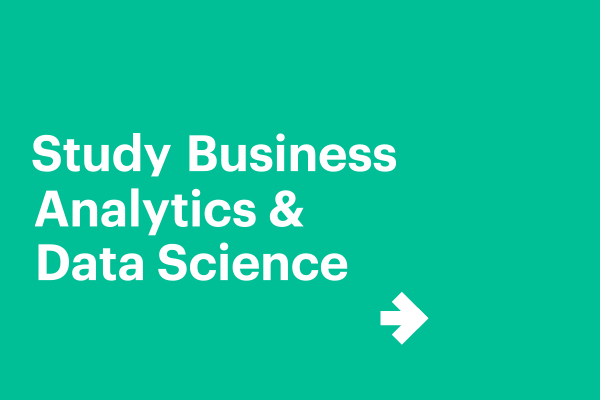Here’s How Data Science and Business Analytics Skills can Help You Advance Your Career
Did you know that in the last 5 years, nearly 90% of businesses have adopted analytical capabilities?
These capabilities are becoming essential in a business landscape where competition is fierce and efficiency is the key to maximizing profits.
Companies across the world now use data to simulate potential scenarios, predict future opportunities, keep an eye on competitors and improve internal capabilities.
As this analytical field grows within businesses, the need for students who are specialized in these skills is also growing.
What is business analytics?
Business analytics is all about finding better solutions that solve real problems that businesses are facing.
It’s a concept that’s been around for a long time but, as the amount of data we have access to has increased exponentially in previous years, the use of data and analytics has become much more crucial for businesses.
From analyzing company data and looking back at historical data, to coming up with new sales strategies and improving data visualization, there are a lot of things that can be done with access to the right information.
What is data science?
Data science is a much broader term but is very similar to business analytics. Data scientists use data as the foundation of innovation and will use this data to come up with solutions that can be applied to a variety of industries.
Why do data science and business analytics make you so employable?
There is a huge demand for graduates with an interest in data science and business analytics. This is how these skills could help you advance your career.
1. Businesses across the globe are demanding these skills
The first, and the most obvious, reason why these two skills can make you so employable after graduating is that they are so in demand by employers.
Businesses across the world are trying to get to grips with big data, and need people with specific skills to help them make sense of the vast amounts of information to which they now have access.
Data analysts are extremely valuable and sought-after people that every business wants to work with. So, if you have learnt these skills during your degree program, you’ll have the pick of companies to work for – it also means you could command a much higher salary.


2. Your skills can help businesses operate better
If you have the knowledge and skills to make sense of big data, you’ll quickly become a trusted advisor and strategic partner to some of the most senior people in your business.
Any manager or top executive wants to know how to operate better, and effective data analysis plays an important role in helping them devise the correct solution.
Your knowledge could help your business improve and you could be responsible for more efficient decision-making through measuring and tracking metrics and data.
3. You’ll have important problem-solving skills that employers value
With data analytics, you’re presented with endless amounts of information and it’s up to you to figure out a solution based on what you’re seeing.
You’ll be problem solving a lot when you enter any company, and potential consequences could be on a much larger scale than what you’ve been used to during your studies.
Businesses don’t want to make mistakes, so they want people on their team with excellent problem-solving skills – something that every data analyst has.
Being able to think analytically and find innovative approaches to problems is extremely useful in all aspects of life – both professional and personal.
4. You can identify trends and turn them into goals
When you spend your time examining data, you’ll quickly find it easy to identify trends and similarities.
With this information, you’ll be able to recommend and advise on the best course of action to improve your company’s performance.
Turning trends into goals takes skills, but, when done correctly, it can engage customers, boost profitability and ensure long-term success.
5. You’ll be able to identify and refine your company’s target audience
A company can never succeed if they aren’t targeting the right customers: however, many businesses don’t know where to start when it comes to identifying these groups.
Data scientists will be able to take existing data – which might not be useful alone – and manipulate it to generate insights that your company can use to discover their perfect customers and engage effectively with them.
You’ll be able to precisely identify the groups of people that will be most interested in your business. This takes the risk out of your next marketing campaign and allows different departments to tailor their offerings accordingly to suit your customer base.
Study Business Analytics and Data Science at EU Business School
At EU Business School, we offer a range of degree programs that prepare our students for success in the workplace of the future.
Our innovative programs are specifically designed to get you ready for some of the most in-demand jobs out there, including careers in business analytics and data science.
If you think that this could be the career move for you, why not come join us and study for our Master in Business Analytics & Data Science.
This program will give you a comprehensive foundation in data science and business analytics. You’ll learn using industry-leading software, tools, and applications that you’ll find commonly used in real-world business.
Not only will you learn the theoretical information you need for a career in these fields, we’re also passionate about providing a practical, hands-on approach to learning so you can understand how to transfer your learning into a future business application.
After the degree, you can go on to roles such as data analytics consultant, operations analyst, data scientist, or financial risk manager in a range of different areas.
If you’d like to find out more about our courses or would like to talk to someone about the best choice for you, get in touch with our admissions team.















